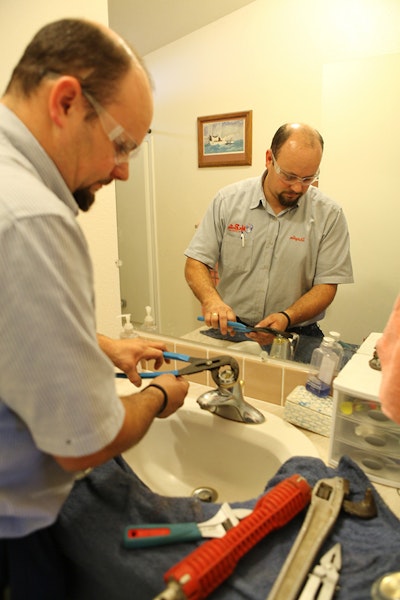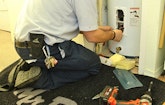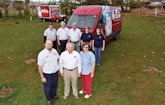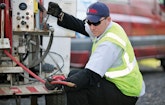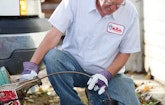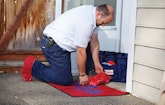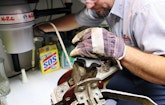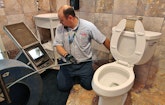Interested in Cleaning?
Get Cleaning articles, news and videos right in your inbox! Sign up now.
Cleaning + Get AlertsIt may seem counter-intuitive, but the key to success for Mr. Rooter of Tri-Cities in Benton City, Wash., has been to spend a lot of time with each customer. Instead of rushing through a job to move onto the next one, technicians take time to talk with customers before they start any work. Customers have responded well to the extra level of care, resulting in a 65 percent repeat business rate and $900,000 in annual sales.
Mr. Rooter of Tri-Cities provides drain cleaning and plumbing services to residential and commercial properties. A quarter of the business is drain cleaning and hydroscrubbing, while the remainder is pipe bursting, pipe lining, and general plumbing services, such as installing water heaters and repairing toilets and faucets. The company serves five counties in southeastern Washington and northeastern Oregon that cover a 140-mile-wide area with a total population of half a million people. General manager Dan King bought the Mr. Rooter franchise in 1997 and now has 12 employees, including his wife, Jill (office manager), and son, Shaylin (operations manager).
Customer-centered
In lieu of hourly billing rates, the company uses a flat-rate pricing structure that eliminates concerns about the number of hours it takes to complete a job. "It doesn't matter how long we spend with a customer," Dan says. "They know the price before we start to work and it sets their mind at ease. They don't worry about how many hours we will be there."
During a visit, technicians follow a 14-step customer service model to ensure the customer is well served and the property is protected, by giving the red carpet treatment at the door, wearing shoe covers and laying down work mats, and leaving the home cleaner than it was originally.
Education is an extremely important step to help reduce a customer's stress. "We usually like to spend 10 or 15 minutes assessing the situation, explaining what is going on, and what we can do to alleviate the symptoms or fix the problem permanently," Shaylin says. "We want to fix it once, fix it right, and fix it forever so they don't have to worry about it."
Taking time to educate people about their plumbing needs allows technicians to build relationships that result in repeat business. Discussing costs for the job doesn't occur until 30 to 45 minutes into a visit.
"The longer we spend with a customer before we talk about price, the less important price becomes because we are giving them value along the way and helping them realize we are concerned about their property and their issues," Dan says. "The highest priority is to take care of the customer, which includes making them feel comfortable having a stranger work in their home."
Staffing challenges
Using such a different customer service philosophy sometimes creates staffing problems for Mr. Rooter Plumbing of Tri-Cities. "We struggle with retention," Shaylin says. "It's a challenge finding technicians who are dedicated to our way of doing business because it's different than how other companies do it. We are constantly looking for good-quality employees."
The company uses a three-step interview process to screen candidates. After a general initial interview, a second interview involves a more in-depth discussion about Mr. Rooter's customer service process. A third interview often includes the candidate's spouse or partner to make sure everyone understands the dedication required for the job.
"Often the problem is with the spouse," Dan says. "They have a hard time with the hours or with being on call, so we want them to be on board and know what to expect."
To evaluate the effectiveness of its technicians, the company tracks closing rates to determine how many consulting visits resulted in a sale. "They need to give the customer a reason to do business with us," Dan adds. "If customers call to say they like their tech, we know they're taking care of the customer."
Food and other clogs
Several nearby food processing plants provide regular business, particularly in the summer months. Processors of potatoes, onions and other vegetables occasionally experience blockages in their product transportation lines. A blocked line results in lost profits for a processor, so Mr. Rooter technicians must respond quickly to emergency calls at any time of day or night.
One regular customer is a potato processor that experiences clogs in a 10-inch, 500-foot overhead pipe transporting raw product across the plant. The blockage is often several feet deep with compacted potatoes. The technician must suit up in rain gear, get elevated with a man lift, open the pipe, and use a hydroscrubber to break up the potatoes and dislodge the clog.
The Kings see a great opportunity to grow their commercial business by creating a division dedicated strictly to commercial customers, particularly restaurants. "A residential customer may use a plumber every three years, but a commercial business uses a plumber every couple months," Dan says. "Generally, commercial work is repeat work. We could expand our business immensely just on that volume of work."
The company plans to hire a sales manager to call on commercial accounts and set up more preventive maintenance programs with regularly scheduled drain cleanings to avoid emergency blockages that cause downtime.
State-of-the-art equipment
Investing in the latest plumbing and rooter equipment has given Mr. Rooter of Tri-Cities an edge over its competition. For example, the company was the first in the area to have cameras installed on its trucks in the mid-1990s. Today, it's the only company in the region equipped to do pipe bursting and residential pipe lining, and one of the few with a trailer jetter. The reason for buying state-of-the-art equipment goes back to the basic idea of taking care of customers and meeting their needs.
"It's not always in the best interest of the customer to tear up their yard and landscape. They have an investment in it," Dan says. "We have the technology to replace sewer lines without destroying what they've worked so hard to develop."
Recently, the company won a pipe replacement job in which the bid was a couple thousand dollars more than the competitor, but the customer saw the value in a trenchless repair instead of excavating the yard. "They went with us even though it would cost more," Shaylin says. "They looked at the cost and expense to repair their yard and decided it was worth the investment now instead of the hassle of fixing their yard later."
The company has demonstrated the value of alternative repair methods by providing free video inspections of sewer lines. The technician can better view which lines need work and can sell more repair work versus companies that don't do video inspections.
Trenchless equipment has also helped garner business for some atypical projects. In summer 2011, Mr. Rooter of Tri-Cities helped the city of Walla Walla, Wash., replace 20 lateral sewer lines in a neighborhood without damaging old-growth trees. Technicians used pipe bursting to upsize 4-inch pipes to 6-inch pipes without disturbing the tree roots. In 2008, the company replaced 950 feet of sewer line at a rest stop that was built on a protected ancient Indian burial ground near the Hood River in Oregon. Using pipe bursting, it took 10 days to replace the sewer line without disrupting the burial sites.
Mr. Rooter of Tri-Cities has five service vans and two trailer-mounted jetters from US Jetting and Lely Manufacturing. The equipment fleet includes cart jetters from MyTana, Spartan and Viking, as well as 3/4-inch augers and several Spartan sink machines. For pipe replacement jobs, the team uses TRIC Trenchless equipment, a Vermeer Hammerhead Mole and the Nu Flow pipe lining system. A Komatsu excavator and Kubota tractor are available for jobs that require excavation, and all service trucks are outfitted with locators and cameras for video inspections.
The future is water treatment
Looking ahead, Mr. Rooter of Tri-Cities believes the future of the plumbing industry will be in-home water treatment. In fact, the company plans to build a water treatment division for selling and installing water filters, conditioners and softeners.
"Many people are buying bottled water and Brita home filters because they aren't happy with the quality of their water," Shaylin says. "We have solutions they can have in their homes to have quality water everywhere."
Shaylin believes the growing displeasure with city-provided water is due to higher chlorine usage by municipalities, which can cause unpleasant odors in the water. "Most people don't know they can do anything about their water quality, so they live with it," he says. "We need to get the word out that we can take care of it with home carbon filters."
